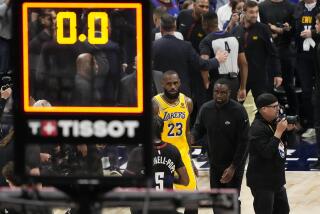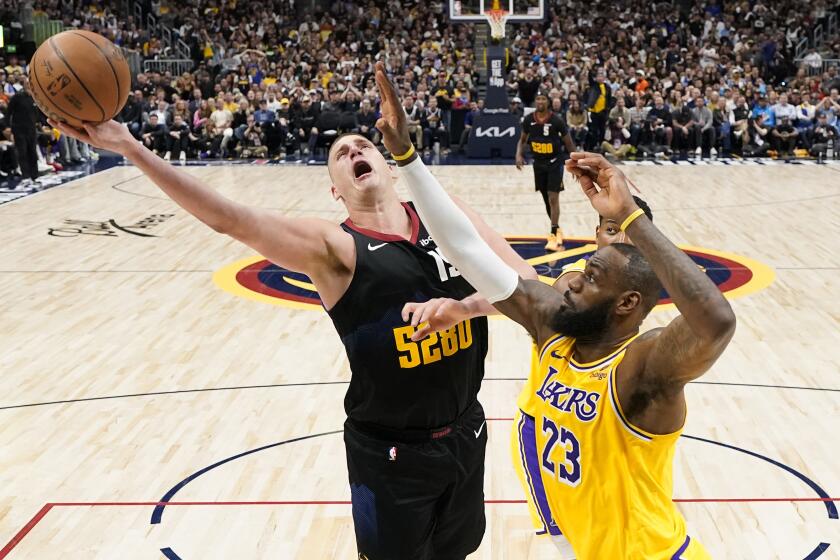A game lifts on prose of pitcher
I’ve always thought of Jim Brosnan as complete in a way that few other players have been in the whole sprawling history of baseball. Of course, if you look at nothing but the cold hard facts of his career, you might call me delusional. Brosnan came off the Cincinnati sandlots, where he grew up playing with Don Zimmer and Jim Frey and considered himself lucky when the Cubs signed him out of high school 60 years ago. A pitcher lucky to be a Cub? Broz would soon learn what it meant to be naive.
He survived by letting his inner realist emerge and went on to play in the major leagues for nine seasons. In 1954 and from 1956 to 1963, as a starter and reliever with four teams -- the Cubs, the Cardinals, his hometown Reds and the White Sox -- he won 55 games, lost 47 and had 67 saves, all to the tune of a 3.54 earned-run average. He was, in his own words, “an average professional baseball player.”
But he rose far above that description with a statistic that the Baseball Encyclopedia fails to note. Number of books published: two. Both were nonfiction, written by him in diary form over the course of two baseball seasons. Their titles, as I hope you know, are “The Long Season” and “Pennant Race.” There is nothing average about either one. They are, rather, a window into what made Jim Brosnan a complete pitcher -- smart, funny, insightful, irreverent, marvelously well-written and, most important, honest.
“Pennant Race” follows the Reds’ march to the 1961 National League championship. Brosnan salted it with one well-observed gem after another, the best remembered of which may be this: “Candlestick Park is the grossest error in the history of major league baseball. Designed at a corner table in Lefty O’Doul’s, a Frisco saloon, by two politicians and an itinerant ditch digger, the ballpark slants toward the bay -- in fact, it slides toward the bay and before long will be under water, which is the best place for it.”
It was, however, “The Long Season,” a chronicle of the 1959 campaign, with which Jim Brosnan made history. This is not the fiction that Ring Lardner, Bernard Malamud and countless other non-playing writers have served up. Nor is it a kid-friendly biography of the kind that has cluttered bookstores since publishers discovered the market for baloney and outright lies.
Brosnan used “The Long Season” to take readers onto the field, but he didn’t stop there. His tour continued on into the dugouts, clubhouses, planes, trains and hotel rooms where baseball players lived out their lives, from February until October. He laid bare strengths and weaknesses, triumphs and indignities, good times and bad, his own as well as his teammates’. Granted, he realized his era wasn’t ready for the vulgarity that is a staple of baseball conversation. And he steered clear of the sexual shenanigans we have come to realize are part of big league recreation. (In the days he wrote about, there wasn’t even a designated hitter, and the champions of the two eight-team major leagues went straight to the World Series.) And yet Brosnan’s readers -- not just baseball fans but thinking people interested in the human condition -- got the picture.
It was right there on Page 1. Broz, working in the off-season at a Chicago advertising agency, calls home to see if there are olives for martinis. (That was the first surprise: He didn’t drink milk.) His wife, Anne Stewart, tells him his contract from the Cardinals has arrived. He’s coming off a strong season and looking for a big raise, all the way to $20,000. On Page 2, he finds out the Cards have no intention of giving it to him.
Welcome to the big leagues before agents and free agency, when ballplayers were indentured servants.
By lifting the veil of secrecy from his world, Brosnan ventured where no player had ever gone. There are those who say that John Montgomery Ward, a 19th-century fireballer, was the first to break this literary ground. But my old friend Jerome Holtzman, baseball’s tireless unofficial bibliophile, doesn’t include anything by Ward in his collection. And as Broz once told me, if Jerry Holtzman doesn’t have it, it doesn’t exist.
So Brosnan was the first of baseball’s dugout literati. Without him, there might have been no “Ball Four” by Jim Bouton a decade later, which would have been a loss of epic proportions. Then again, Sparky Lyle might not have put his name on the scabrous “Bronx Zoo,” which would have been a blow for good taste. And what to say of Jose Canseco and “Juiced”? You take the wretched with the sublime, I guess.
But never forget this: “The Long Season” by Jim Brosnan was, and is, the best of its kind.
Not that there weren’t those who howled angrily when it was published. Some were the chowderheads in baseball too dim to appreciate his affectionate portrayals of players like Don Blasingame and Smoky Joe Cunningham and his reverence for Fred Hutchinson, his manager in Cincinnati. I’m embarrassed to say that other detractors were sportswriters who may not have known what to make of a player who wore glasses, smoked a pipe and read books. As Brosnan wrote later, “I was, on those accounts, a sneak and a snob and a scab.”
But I am here to tell you that he was a model of intellectual courage. It’s a quality in short supply no matter how long the parade is of hitters willing to risk stopping a 97-mile-an-hour fastball with their heads. If there were more courage of the mind -- if there were more ballplayers who could face the truth and stand tall when they did it -- we might know, for instance, just how rampant steroid abuse was during the Great Home Run Epidemic. But Brosnan was, obviously, a rarity.
When he wrote about his life in baseball, he did it with candor sustained by wit. You can turn randomly to almost any page in “The Long Season” and find an example of what I’m talking about. Consider this: “I maintain a small library in my locker in the clubhouse. Nothing like a book to keep your mind from thinking.”
Or this, when Broz learns that the Cards have traded him to Cincinnati, just as the Cubs once traded him to the Cards: “I sat back on the couch, half-breathing as I waited for indignation to flush good red blood to my head. Nothing happened. I took a deep breath, then exhaled slowly. It’s true. The second time you’re sold you don’t feel a thing.”
And then there is my favorite, which tells so much about the era and the art of not just pitching but of getting your mind right to do it: “[Willie] Kirkland ran up to the plate, eagerly. My old homer-hitting buddy. Six home runs off me in three years. I stepped back off the mound to hate Kirkland with my eyes. (Early Wynn says a pitcher will never be a big winner until he hates hitters.) I growled a negative growl at [Dutch] Dotterer’s sign. No, sir, if Kirkland hits a home run off me on this pitch it will be from a prone position. Down he went. My control was excellent. He fouled off the next slider, fouled off a curve, and fanned on a fastball right under his chin.
“Well, that pitch did it. When a pitcher can rid himself of the feeling that he can’t get a certain hitter out, he knows he’s got good stuff. The Giants stared at me for six innings, waiting to see Old Broz, Old Nervous Broz, start to waver, start to think on the mound. They waited in vain ... “
Brosnan’s improvement as a pitcher was a welcome side effect of “The Long Season.” As he told me when I interviewed him in 1980, “I was rid of all the B.S. that had always cluttered my mind. I’d always dwelled on my bad days, my embarrassments, and as a result, I was just competent. The book finished that. It gave me the self-confidence I’d always lacked.”
Think of that for a moment: He got his act as a pitcher together and we got a classic in baseball literature. To my ears, that sounds like one of the greatest trades ever.
So it is that we are gathered here today to salute the pitcher, author and freethinker who was known by so many names: Broz in his own thoughts, Meat to his wife, and The Professor to his teammates. Now we have something else to call him: Eternal.
Please join me in welcoming Jim Brosnan to the Baseball Reliquary’s Shrine of the Eternals.
--
This is the speech Schulian plans to deliver in accepting Brosnan’s induction today into the Baseball Reliquary’s Shrine of the Eternals. Brosnan cannot attend because of health problems. Schulian, a TV writer-producer and former Chicago Sun-Times sports columnist, is the author of “Twilight of the Long-ball Gods,” a collection of his essays on baseball.
More to Read
Get our high school sports newsletter
Prep Rally is devoted to the SoCal high school sports experience, bringing you scores, stories and a behind-the-scenes look at what makes prep sports so popular.
You may occasionally receive promotional content from the Los Angeles Times.






